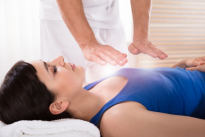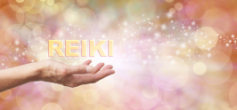Frequently Asked Questions


Angelic Reiki is an amazing Japanese healing art that re-balances the natural mechanisms in your body called chakras, clearing blockages of energy flow in your body. It does not replace conventional medical practices and you should always consult a doctor if required. Angelic Reiki calls upon the Angelic Kingdom of Light to enhance the body's natural healing abilities.
The word Reiki (pronounced ray key) can be split into two components: "rei", meaning Universal, and "ki" (or qi, chi), meaning life-force energy. This is energy of the highest and purest form, the very essence that supports and sustains life. Utilising the methods within the Reiki System, the practitioner transfers healing energy to another person through the laying on of hands.
What happens during a Reiki treatment ?
During a Reiki treatment you will lie or sit comfortably and I will place my hands on or near your body, allowing the Reiki energy to flow to you. You do not need to remove any clothing except for coat and shoes.
What benefits does Reiki offer?
Reiki energy passes from the practitioner to the recipient and works on many different levels.
Reiki is a healing process that can benefit anyone in the normal course of their life. Research suggests that it has the ability to reverse stress-induced conditions. It should not, however, be regarded as a cure for medical conditions. As a natural form of healing, Reiki can support and enhance other forms of treatment. It has no contra-indications; pre-existing medical conditions do not impede the effectiveness of Reiki, and it can be performed on people of any age. It is given with hands on (touching) or hands off (non-touching). Most recipients find it extremely relaxing and calming. Most importantly anyone can learn the technique and deliver Reiki to themselves and others on a daily basis.
The main benefits of Reiki are as follows:
- Balances the body's organs and glands and their functions
- Treats symptoms and causes of illness
- Releases blocked and suppressed feelings
- Strengthens intuition
- Promotes natural self-healing
- Strengthens life-force energy
- Adapts to the natural needs of the recipient
- Promotes creativity
- Relieves pain
- Relaxes and reduces stress levels
- Strengthens the immune system
- Clears toxins
- Heals holistically
Each session costs £30 (in cash please) and lasts approximately 1 hour, although the initial session will be a little longer.
How many treatments am I likely to need?
This depends on what you are hoping for from Reiki. As a natural healing method it is good to allow plenty of time for Reiki to have an effect, so in most cases a series of treatments is going to be more beneficial than a single treatment. How many each person might personally need will be discussed at your initial session and reviewed as you proceed through treatments. Generally, it takes three to four Reiki treatments to address 80% of a body's issues.
What should I expect from my first session?
In a typical session, I will introduce you to Reiki and ask if there are any particular concerns or areas in the body/feelings/emotions/thoughts on which you wish to focus. During the first session you will sign a consent form. All sessions are of course entirely confidential.
I will ask if you feel comfortable with me resting my hands gently on your heart centre and solar plexus (just below the ribcage) while I work to clear the major energy centres in the body, commonly known as chakras. I may move to other parts of your body (shoulders, head, legs and feet) as I feel necessary. If at any point you feel uncomfortable, simply say so, as I can always find ways to adjust the procedure.
During the session, you will usually be lying down on a treatment couch, (although you can be seated if you prefer), fully clothed with your eyes closed. Music is played in the background for the duration of the Reiki healing.
After the session, we will discuss the experience, reflecting on what you saw, felt or heard.
I will keep minimal paper records in order to monitor the progress of your treatment. Again, these remain 100% confidential.
What effects should I expect from a healing session
You may feel various sensations, or you might feel nothing, as everyone is different. Most people experience a sensation of deep relaxation, positive visions or sometimes prickling or intense cold or heat, but it is never painful and it is non-invasive. The most wonderful aspect of Reiki is that it cannot do any harm, only good. Angelic Reiki always provides healing for a client's highest and greatest good.
After the Reiki session you may experience the effects of detoxing (clearing of energies), such as feeling emotional or physically changed, or maybe even tired for a day or so. This is completely normal, and Reiki generally gives most people a positive boost in energy or they feel super-relaxed.
How should I prepare for my first treatment?
Wear loose, comfortable clothing. Bring a face covering with you to comply with the current government guidelines on Covid-19. The main thing is to be relaxed about your session and keep an open mind. Believe it or not, healing actually begins before the first session.
Do I need to do anything after the session
As with any form of healing, aftercare is central to the practice. After a Reiki session, you are advised to take it easy, with plenty of rest and drinking lots of water, which will help to integrate the positive healing effects of Reiki. It is useful to take note of any dreams or thoughts that may arise, which can provide an insight into the healing process and help any subsequent sessions.
Can Reiki be used in conjunction with conventional medicine?
Yes, Reiki can be used safely in conjunction with all conventional medicine. It may help to speed up recovery times and reduce some uncomfortable symptoms, such as those that may arise after surgery.
Can Reiki be combined with other forms of complementary medicine?
Reiki can complement many different forms of treatment and can often help smooth the healing process. Following a chiropractic treatment, for example, a Reiki treatment can help reduce feelings of stiffness or discomfort. It is also reported to work extremely well in conjunction with homoeopathy, acupuncture and counselling and can help support any healing process.
Is Reiki suitable for children?
Yes, with written parental consent, Reiki is suitable for children under 18 as it is gentle and can be adapted to a child’s need for a shorter treatment. Parents may accompany their child during the entire Reiki session.
Can Reiki help someone with a terminal illness?
People suffering from a terminal illness often find Reiki helps them to feel more calm and relaxed, reduces symptoms such as pain and enables them to prepare for death.
Can you give Reiki to someone who is dying?
Yes, Reiki can be offered to a person who is dying, and it has often been reported to reduce anxiety, and bring about calm.




